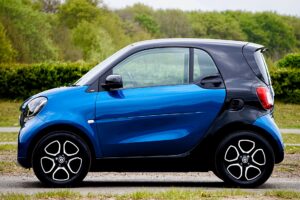FAQ
- EV Basics
- Driving an EV
- EV Range
- How far can I go in an EV?
EV range is typically around 80 miles for a generation 1 used EV to with newer EVs going 250 to nearly 400 miles on a full charge. The average American’s daily round-trip commute is less than 30 miles.
If you are nervous or impatient about charging, consider a plug-in-hybrid electric vehicle. Since a large majority of a car’s miles are typically from short trips, a Prius Prime, Chevy Volt or Honda Clarity can meet your needs. On a long road trip, the gasoline engine kicks in. For example, a 2017 Prius Prime uses electric power for trips under 20 miles, giving it an overall fuel efficiency reported by owners of 85 mpg.
If you have two cars, your gas powered car could be for your long distance trips. Or you could also borrow or rent a gas powered car. - Compare EVs Range, Price & Specs.
- How long does it take to recharge?
A 110v outlet (called Level 1 charging) typically gives you 4 – 6 miles of charge per hour.
A 220v outlet (called Level 2 charging) typically gives you 20 miles of charge per hour. - Are there enough charging stations?
- New Battery Developments Could Increase Range<
- How far can I go in an EV?
- Are EVs affordable?
- Can I afford an EV?
You can buy a reliable used EV for as low as $5000. Consider these two options:
A 2013 Nissan Leaf (Average Range 53 miles) costs from $5,000 to $6,300 at dealerships within 500 miles of Ashland (According to Consumer Reports). If you are able to buy this from a dealer and you are low or moderate income, you may be able to get a $2,500 Oregon State Rebate. If you are an Ashland utility customer you can get an additional $1,500 off.
A 2014 Chevy Spark (Average Range 70 miles) costs around $6,500 at dealerships within 500 miles of Ashland according to carguru.com.
See an updated list of Spark’s here. - Can I get tax incentives and rebates?
- Electric vs. Gas: Is It Cheaper to Drive an EV?
- How much will an EV save in fuel costs?
Consider this example: If you replace a gas car that gets 24 mpg with a 2015 Nissan Leaf and drive 10,000 miles/year, you would save almost $4,000 over 5 years. You can plug in different assumptions with this City of Ashland Calculator. - Why do EVs have 50% lower maintenance and repair costs (on average) over a car’s life?
EVs have a fraction of the moving parts of gasoline vehicles and are very reliable. That means no oil changes, no spark plugs, catalytic converters or other emissions equipment. They also use fixed gears instead of transmissions which further reduces maintenance. Electric vehicles also have regenerative braking systems that save wear and tear on the brakes. According to a September 2020 Consumer Reports article you can save $4,600 on average over the life of the car by buying an EV vs. gasoline powered car. - How Does Having an EV Affect Auto Insurance?,/li>
- Survey shows less than 1% of EV owners want to go back to gas
- Can I afford an EV?
- What Are The Advantages and Disadvantages Of A Hybrid Car
- The Ultimate Electric Vehicle Glossary: Every Term You Need to Know
- A new, free US support line is providing electric vehicle advice
- Although they’re better than gasoline vehicles, what are the environmental impacts of EVs?
- How many Oregonians have made the switch?
- The EV Revolutions Critics can’t Dispute

